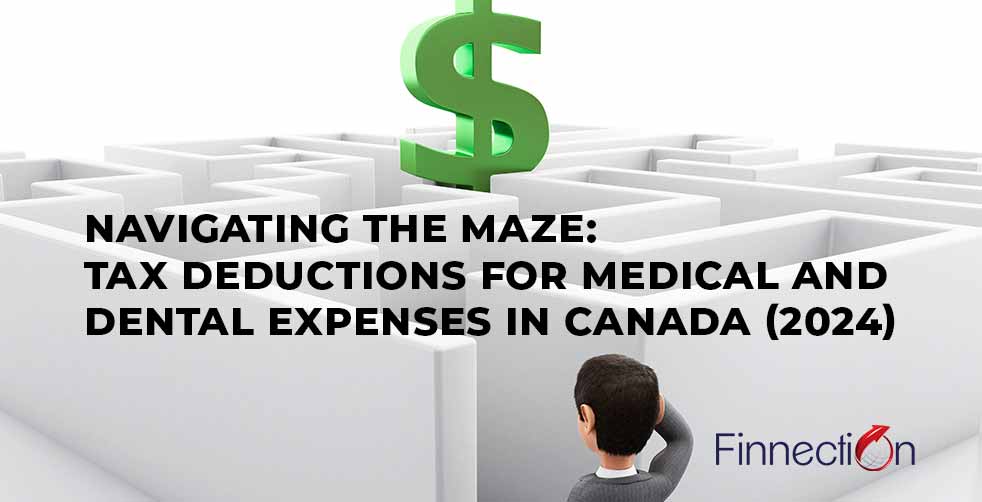Canadians are fortunate to benefit from a robust universal healthcare system. However, certain medical and dental expenses not covered by provincial plans can qualify for tax deductions, potentially reducing your tax burden. This article delves into the intricacies of claiming medical and dental expenses on your 2024 Canadian tax return.

Eligible Expenses: What Counts?
The Canada Revenue Agency (CRA) maintains a comprehensive list of eligible medical and dental expenses. Here are some key categories:
Medical Practitioners: Fees paid to doctors, dentists, optometrists, physiotherapists, and other licensed healthcare professionals.
Prescriptions and Medical Supplies: Costs associated with prescription medications, insulin, contact lenses, eyeglasses, hearing aids, and other medically necessary items.
Hospital and Clinic Fees: Payments for non-covered services in hospitals or outpatient clinics, including room charges and diagnostic tests.
Medical Treatments: Expenses for various treatments like laser eye surgery, acupuncture, and speech therapy, provided they are performed by a qualified practitioner.
Travel Expenses: Travel costs incurred when seeking medical treatment not available locally, including mileage driven using your personal vehicle.
Premiums: Payments for private health insurance plans that cover eligible medical expenses not covered by provincial plans.
Disability-Related Expenses: The cost of special equipment, therapy, and other expenses related to a disability, provided a valid Disability Tax Credit (DTC) certificate is available.
Important Exclusions: Be Aware of What Doesn’t Count
While the list of eligible expenses is extensive, there are some notable exclusions:
Cosmetic Procedures: Procedures not deemed medically necessary, like elective surgeries or cosmetic dentistry, are not deductible.
Over-the-Counter Medications: Costs of non-prescription medications and vitamins are not claimable.
Healthy Lifestyle Expenses: Gym memberships, weight loss programs, and other expenses related to general health and wellness are not considered medical expenses.
Maximizing Deductions: Understanding the Limits
There are two limitations to claiming medical and dental expenses:
Minimum Threshold: You can only claim the portion of your total eligible medical expenses that surpasses the lower of:
- 3% of your net income reported on line 15000 of your tax return.
- $2,479 (amount may change for subsequent tax years).
For example, if your net income is $50,000 and your total eligible medical expenses are $1,200, you cannot claim any deduction as it falls below the 3% threshold ($1,500). However, if your expenses were $4,000, you could deduct the amount exceeding the lower of 3% ($1,500) or $2,479, resulting in a deduction of $2,521.
Dependant Expenses: You can also claim medical and dental expenses paid for your spouse or common-law partner, and your dependent children under 18 at the end of the tax year. However, these expenses are subject to additional calculations and limitations.
Gathering Proof: Keeping Records is Key
To claim medical and dental expenses, you need to maintain proper documentation. This includes:
- Receipts for all eligible medical and dental expenses paid during the tax year.
- Statements from medical practitioners or insurance companies detailing services received and costs.
- Proof of relationship for any claimed expenses related to dependants.
The CRA recommends keeping these records for at least six years after the year you file your tax return.
Seeking Professional Help: When to Consider an Expert
Understanding tax deductions can be complex. Consider consulting a tax professional if:
- You have extensive medical or dental expenses.
- You claim expenses for dependants.
- You’re unsure about the eligibility of specific expenses.
- You have a disability and require guidance on claiming disability-related expenses.
A tax professional can help you navigate the complexities of the medical and dental expense deduction process, ensuring you claim all eligible deductions and maximize your tax savings.
Conclusion
By understanding the eligible expenses, limitations, and record-keeping requirements, you can effectively claim medical and dental expenses on your Canadian tax return for the 2024 tax year. Remember, with proper planning and potentially the assistance of a tax professional, you can navigate the tax deductions maze and reduce your tax burden.
If you have any questions regarding Tax Filing, feel free to contact finnection via email at info@finnection.ca or call us at (647) 795-5462
Disclaimer: Above information is subject to change and represent the views of the author. It is shared for educational purposes only. Readers are advised to use their own judgement and seek specific professional advice before making any decision. Finnection Inc. is not liable for any actions taken by reader based on the information shared in this article. You may consult with us before using this information for any purpose.
